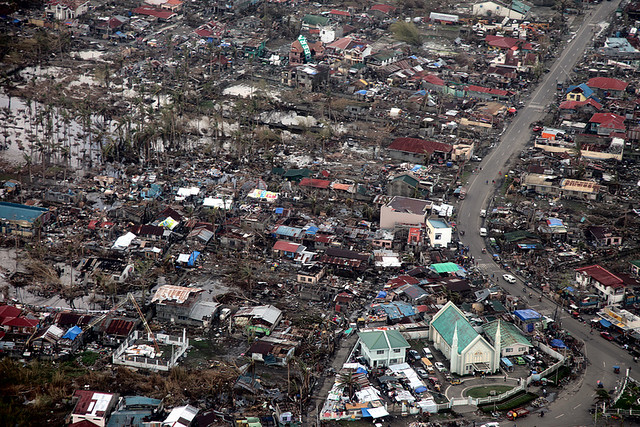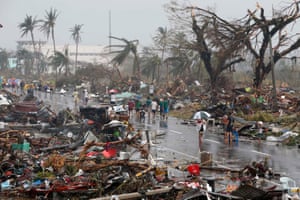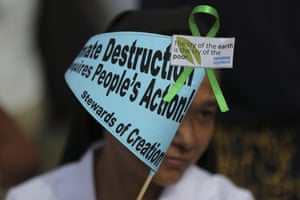http://e-info.org.tw/node/117405
菲國提氣候人權訴訟 殼牌、BP等碳排大戶入列
文字大小
6 1 Share1
本報2016年8月1日綜合外電報導,姜唯編譯;蔡麗伶審校
菲國政府人權事務調查單位「人權委員會」(Commission on Human Rights of the Philippines , CHR)寄了一份60頁控訴書給殼牌、BP、雪弗龍等47大排碳公司,指控他們的排碳活動已經侵害數百萬菲律賓人享有「生命、糧食、水、衛生、適當居所和自決」的權利,要求他們在45天內回覆。
這將是CHR首次對企業展開正式調查,也是全世界第一個由政府單位提出的氣候人權調查活動。
2013年海燕颱風侵襲菲律賓時,造成滿目瘡痍的景象。攝影:Russell Watkins。(CC BY 2.0)
控訴書中指出,這47家公司應對他們在菲律賓境內排放的溫室氣體負責,要求他們說明如何消弭、補償和預防氣候變遷造成的人權損害。
控訴書呼籲這些公司著手調查氣候變遷與海洋酸化造成的人權損害,以及公司是否未負應負責任。
由7000個島嶼組成的菲律賓,是全世界最容易受氣候變遷損害的國家之一。菲國史上最嚴重的四個超級颱風,全都發生在過去10年間,洪水和熱浪越來越嚴重,顯示和人為的全球暖化有關。2013年的海燕颱風造成6000人死亡、65萬人流離失所。
海燕颱風的倖存者和非政府組織合力推動此次的控訴,並獲得3萬1000名菲律賓人的支持。
完整的法律調查行動預計在10月各公司回應後展開。雖然這47家公司被要求參加公聽會,但CHR只能強制其中十間在菲律賓有辦公室的公司出席。不過,如果任何一家公司拒絕配合,CHR有權尋求聯合國協助。
受調查的47間公司清單是根據美國科羅拉多州氣候責任研究所希德(Richard Heede)的研究產生。2013年,希德計算出工業革命以來,90間公司製造了全球2/3的溫室氣體。希德指出,這些公司從2010年至2013年排放了315億噸二氧化碳當量,佔工業排放總量的22%。
CHR並非法院,無法強制企業減排或罰款。不過,CHR可以提供政府建議,並施加國際壓力,要求股東從碳排大戶撤資。
World's largest carbon producers face landmark human rights case
Filipino government body gives 47 ‘carbon majors’ 45 days to respond to allegations of human rights violations resulting from climate change
The world’s largest oil, coal, cement and mining companies have been given 45 days to respond to a complaint that their greenhouse gas emissions have violated the human rights of millions of people living in the Phillippines.
In a potential landmark legal case, the Commission on Human Rights of the Philippines (CHR), a constitutional body with the power to investigate human rights violations, has sent 47 “carbon majors” including Shell, BP, Chevron, BHP Billiton and Anglo American, a 60-page document accusing them of breaching people’s fundamental rights to “life, food, water, sanitation, adequate housing, and to self determination”.
The move is the first step in what is expected to be an official investigation of the companies by the CHR, and the first of its kind in the world to be launched by a government body.
The complaint argues that the 47 companies should be held accountable for the effects of their greenhouse gas emissions in the Philippines and demands that they explain how human rights violations resulting from climate change will be “eliminated, remedied and prevented”.
It calls for an official investigation into the human rights implications of climate change and ocean acidification and whether the investor-owned “carbon majors” are in breach of their responsibilities.
The Philippines, an archipelago of more than 7,000 islands, is one of the most vulnerable countries in the world to climate change.
Four of its most devastating super-cyclones have occurred in the last decade, and the country has recorded increasingly severe floods and heatwaves that have been linked to man-made global warming.
Typhoon Haiyan, known locally as Yolanda, was one of the most powerful storms ever recorded, killing more than 6,000 people and displacing 650,000 others in 2013.
The legal complaint has been brought by typhoon survivors and non-governmental organisations and is supported by more than 31,000 Filipinos.
“We demand justice. Climate change has taken our homes and our loved ones. These powerful corporations must be called to account for the impact of their business activities,” said Elma Reyes from Alabat Island in Quezon, who survived super typhoon Rammasun in 2008 and is part of the group submitting the complaint to the CHR.
The full legal investigation is now expected to start in October after the 47 companies have responded. Although all 47 will be ordered to attend public hearings, the CHR can only force those 10 with offices in the Philippines to appear.
These include Chevron, ExxonMobil, BP, Royal Dutch Shell, Total, BHP Billiton, Anglo American, Lafarge, Holcim, and Taiheiyo Cement Corporation. The CHR has the power to seek the assistance of the UN to encourage any which do not attend to co-operate.
“The commission’s actions are unprecedented. For the first time, a national human rights body is officially taking steps to address the impacts of climate change on human rights and the responsibility of private actors,” said Zelda Soriano, legal and political adviser for Greenpeace Southeast Asia, one of the groups which has brought the complaint to the CHR.
“This is an important building block in establishing the moral and legal ‘precedent’ that big polluters can be held responsible for current and threatened human rights infringements resulting from fossil fuel products. From the Netherlands to the US, people are using legal systems to hold their governments to account and demand climate action,” she said.
The list of the 47 “carbon majors” being asked to respond to the CHR is based on research by Richard Heede, director of the Climate Accountability Institute in Colorado. In 2013 he calculated that just 90 global companies had produced nearly two-thirds of the greenhouse gas emissions generated since the start of the industrial revolution.
Together these companies emitted around 315 gigatons of CO2 equivalent into the atmosphere, or nearly 22% of estimated global industry greenhouse gas emissions from 2010 to 2013, said Heede.
“We pray that the CHR heed the demand to recommend to policymakers and legislators to develop and adopt effective accountability mechanisms that victims of climate change can easily access,” said Father Edwin Gariguez, executive secretary of Caritas Philippines and a recipient of the Goldman environmental prize.
The CHR is not a court and would have no power to force companies to reduce emissions or fine them. However, it can make recommendations to government and would add to the worldwide pressure to persuade shareholders to divest from heavy carbon emitters.
The investigation is the latest in a growing tide of climate liability cases being brought against governments and corporations. In June, the Netherlands’ high court ruled on the world’s first climate liability suit, ordering the Dutch government to take stronger action against climate change to better protect its citizens.
However, several court cases launched in the US urging the US government to take more action against climate change have been dismissed.




沒有留言:
張貼留言